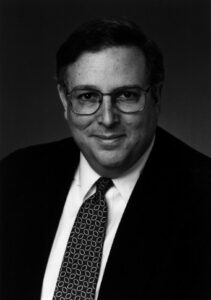Fred Schulte
- 1997

Fellowship Title:
- Medicare and Medicaid Shift to Managed Care
Fellowship Year:
- 1997
The HMOs That Make Money Off The Poor
A few years ago, fistfights would break out in the parking lots of state offices in Miami as HMO salesmen rushed to sign up welfare mothers arriving to pick up food stamps. Some marketers parceled out gifts of diapers or cheap medicines to make a sale. Some falsely told women they would be stripped of Medicaid coverage unless they joined the HMO on the spot. A few agents weren’t above forging signatures on enrollment forms. Florida decided to crack down after media reports of HMO sales alarmed legislators. Last December, state officials agreed to spend $39 million over four years to hire a Medicaid enrollment “broker,” a firm that presents people on welfare with truthful and “unbiased” information about their health care options. Enrollment brokers are the latest hope for states eager to improve the quality of welfare medicine and slow down, if not stop, exploitation of the poor by some managed care plans. About 20 states are using brokers, mostly out of concern that Medicaid HMOs cannot be trusted to market their coverage honestly
Selling Seniors on HMO’s
WHEATON, Md.—On a muggy August morning at Hot Shoppes cafeteria, salesman Matt Buckley tells a group of retirees over coffee that Medicare is changing and they must adapt. The seniors seem worried by the prospect. Yet they know Medicare, the U.S. government’s $211-billion-a-year, health-care system for the elderly and disabled, is going broke and must slash costs. Buckley tries to calm fears and sell his guests on Aetna US Healthcare, one of dozens of cost-cutting health maintenance organizations that are hotly pursuing senior citizens across the country. “This is the first step toward privatizing Medicare. This is the way things are moving,” says Buckley, straining a bit to be heard above the clatter of dishes as the serving staff gears up for the early lunch crowd. “We want to become your Medicare.” Aetna US Healthcare hopes to persuade thousands more seniors to accept managed care, a few tablesful at a time if need be. Toward that end, the company has put on dozens of free Medicare “informational meetings,” mostly at budget eateries, libraries or community

Are Regulators Being Bought Off by the HMO Money Machines?
Florida health czar Doug Cook said he was “sick for a week” after he learned two of his HMO regulators had accepted more than $90,000 in consulting fees from two Medicaid health plans. “Common sense would indicate this is extremely improper,” said Cook, director of the Agency for Health Care Administration. “Ninety-nine point nine percent of our employees would not even consider this. Unfortunately, these two women did.” Douge Cook The health agency fired Elizabeth Page Anderson-McGivern and Rosemary Arbuckle-Anderman last spring for violating restrictions on moonlighting within the health care industry. Both workers were program analysts, helping decide which HMOs got Medicaid contracts. The state alleges they took money from HMOs in exchange for preparing applications for Medicaid contracts. A week after the firings, prosecutors in Tallahassee took the unusual step of charging the women, both of whom have law degrees, with official misconduct, a felony. Both have denied wrongdoing. Whatever the outcome in court, the cases reflect some of the ethical and legal dilemmas emerging as more than 40 states turn to managed

The Medical Gold Rush for Poor Patients
Just a few short months ago, a New York medical insurance plan called AssureCare, Inc. hoped to reap hearty profits caring for thousands of society’s poorest people. Bankrolled by a Florida entrepreneur with a $480 million personal fortune, the HMO seemed likely to snatch up lucrative welfare contracts in several states. Bruce C. Vladeck, the outgoing administrator of the U.S. Health Care Financing Administration. But AssureCare failed to get off the ground. The venture became a casualty of a high-stakes clash between private business and state health regulators over the best means to deliver medical care to the poor. “Our company is in the process of closing down,” AssureCare president Marshall Kelly said in a recent telephone interview from his New York City office. “We decided not to move forward.” AssureCare’s fate reflects mounting concern in a few states over the consequences of turning to start-up, profit-seeking HMOs to care for poor or disabled Americans on Medicaid. With an annual budget of $187 billion, Medicaid serves more than 30 million people, 13.6 million through managed
